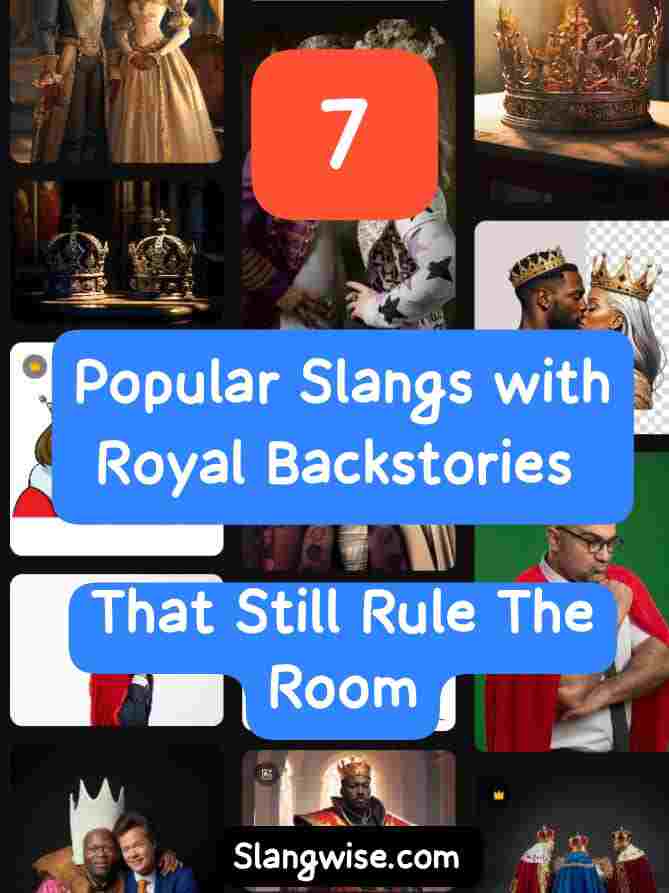Some slang words sound casual, but their roots are regal. Language has a way of sneaking bits of the past into our everyday talk, like hidden jewels in a thrift-store find.
Some of our favorite slang terms didn’t start in viral memes or street corners, they bubbled up from the stuffy, scheming world of kings and queens.
These words carried secrets, status, and a touch of swagger through centuries of velvet robes and iron fists.
Today, they pop up in group chats, gym selfies, and corner offices, reminding us that a good phrase outlives a dynasty.
I’ve always loved how these royal words keep evolving, turning dusty history into fresh attitude.
In the this post, we’ll dig into seven slang stars, each with a throne-worthy origin. From blue-veined aristocrats to coronation highs, get ready to level up your vocab with stories that feel like gossip from a palace spy.
Table of Contents
In a Nutshell
- The Riya Words are: Queen Energy; King Energy; Posh; Crowning Moment; Blue Blood; Regal; Court / Courtly
- These words all borrow royal images; crowns, courts, lineage, and manners, with roots in monarchy, class markers, and historical honor systems.
- Today they’re slangy shorthand on social media and in conversation: praising confidence or status (queen/king), signaling elegance (posh/regal), marking a peak moment (crowning moment), or joking about pedigree (blue blood/courtly).
- Quick use tips: match tone to context; respect origins (some come from queer, Black, or historic culture); use sparingly so the phrase lands; and pair with a plain detail or joke to keep it human.
7 Royal-Rooted Slangs With Royal Backstories
1. Queen Energy
Picture this: a Tudor-era court where women like Elizabeth I ruled not just with laws, but with sheer force of presence.
“Queen energy” captures that vibe today, fierce confidence, unapologetic glow, the kind that makes heads turn without a word.
Back in the 16th century, courtiers whispered about the queen’s “vital spirit,” a term for the magnetic pull that kept rivals in check and admirers hooked.
It wasn’t magic; it was poise sharpened by politics and peril.
Fast-forward, and we’re slapping it on anyone owning a room, from pop divas to your boldest friend at brunch. It’s proof that true power doesn’t need a crown, it just radiates.
What Queen Energy means now: Confident, fierce, glamorous; owning the room without apology.
For Instance, She showed up late and left everyone gagging, real queen energy.
2. King Energy
Kings weren’t always the brooding types in history books; many, like France’s Louis XIV, strutted with a charisma that built empires and broke hearts.
“King energy” nails that today: bold leadership mixed with effortless cool, the aura that says you’re in charge without yelling.
In the Sun King’s Versailles, advisors coined phrases like “royal vigor” to describe how he’d command a hall full of schemers with a single glance or gesture.
It was less about the throne and more about that inner fire that turned peasants into loyalists.
Now, it’s the ultimate compliment for someone crushing a deadline or hyping a crowd, timeless swagger for modern rulers of the roast.
What it means now: Quiet confidence, steady leadership, maturity: the kind of person who takes responsibility and does it smoothly.
Example: “He sorted the problem without drama. King energy.”
3. Posh
Ever wonder why “posh” screams fancy suits and cucumber sandwiches? It traces to 19th-century British high society, where the elite flashed their status with polished manners and pricey threads.
The word likely sprang from “posh,” a clipped form of “polished” or even “postilion” (fancy carriage drivers for the upper crust), but it stuck during Queen Victoria’s reign when industrial barons aped royal excess to climb social ladders.
Courtiers used it slyly to mock newcomers trying too hard at balls and hunts. These days, we toss it at anything sleek and upscale; a posh handbag or a swanky date spot.
It’s a wink to that old guard, but now anyone with style can claim it.
What it means now: Fancy, elegant, upper-class, or stylish – often used lightly or with a wink.
Example: “That boutique is posh, even the receipts feel expensive.”
4. Crowning Moment
Weddings, graduations, that epic comeback shot, we call them “crowning moments” because nothing tops the literal crowning of a monarch.
Think Henry VIII’s sweaty brow under St. Edward’s Crown in 1509, a ritual loaded with pomp and peril that marked the peak of power.
Medieval chroniclers described these as the “apex of glory,” where a ruler’s humanity met divine right in a blaze of gold.
The phrase slipped into common lingo by the 1800s, tagging life’s big wins as mini-coronations.
Today, it’s all over social feeds, celebrating the highs that make you feel unstoppable. Simple, sparkling, and straight from the scepter.
What crowning moment means now: The highlight, the big win, the moment that defines a person or achievement.
For example: “Her TED talk was the crowning moment of a long, brave campaign.”
5. Blue Blood
If you’ve got “blue blood,” you’re supposedly born elite, veins humming with old-money privilege.
This gem hails from Spain’s 15th-century nobility, where fair-skinned Castilian aristocrats bragged about their pale complexions, no sun-kissed labor for them.
Their veins popped blue under the skin, a badge of indoor lounging while peasants tanned in fields.
Sangre azul became the taunt-turned-title, spreading to English courts by Elizabeth I’s time as a dig at untouchable snobs.
Now, it’s slang for anyone with that effortless class, from tech heirs to your aunt’s bridge club. A cheeky nod to how status used to show in your skincare routine.
What it means now: Someone from an old, elite family, or a sarcastic way to describe people who act entitled.
For Instance: “He talks like a true blue blood, even though his golf shoes are from a discount store.”
6. Regal
Short, sharp, and loaded with gravitas, “regal” means looking like you stepped off a palace balcony, all grace and quiet command.
It pulls straight from the Latin “regalis,” kingly stuff that Romans slapped on emperors, but it bloomed in medieval Europe with the likes of England’s Plantagenets.
Knights and ladies used it to flatter (or shade) royals who carried themselves like gods among men, even in muddy tournaments.
By the Enlightenment, it described anyone with that innate dignity, from Voltaire’s salon stars to modern icons.
Drop it now for a killer outfit or poised comeback, and you’re channeling centuries of crown-approved cool. It’s the word that whispers, “Bow down, but make it fashion.”
Regal now means: Majestic, composed, and dignified; often used to praise how someone carries themselves.
For example: “After her promo, she handled interviews with a regal calm.”
7. Court / Courtly
Hang out with the smooth-talkers? That’s “courtly” energy, all charm and calculated flattery that feels like a dance.
Court itself meant the king’s inner circle back in the 12th century; think Eleanor of Aquitaine’s glittering Poitiers gatherings, where poets and plotters vied for favor with honeyed words and sly alliances.
Courtly evolved from those love codes in chivalric romances, a way to say someone navigates drama with finesse, like a pro at royal intrigue.
Today, we use it for the art of wooing or wheeling-dealing, courtly manners at a networking event, or just ghosting with grace.
It’s the slang that turns everyday hustle into a noble game, proving courtesy was always a power move.
What courtly means now: To woo, to gather admirers, or the group that follows someone (a “court”).
Example:
“He’s got a little court of fans who hype every post.”
Why these words still matter
Royal language is useful because it says a lot with one image. A “crown” suggests winning, a “queen” suggests rule and style, and “posh” suggests a lifestyle of comfort.
Using royal words in everyday speech helps people compress complex ideas about status and attitude into quick, catchy phrases.
That’s why these slangs keep cropping up on social media, in headlines, and in casual chat.
If you want to see how modern platforms use royal slang, and how new slang rises and spreads.
How to use these royal slangs without sounding try-hard
- Match tone to the moment. Don’t call a colleague “queen” in a serious meeting, but in a friendly Slack channel it can be perfect.
- Be aware of origin and culture. Some royal slang comes from queer, Black, or historical cultures. Using words respectfully (not to mock or erase) keeps your language smart.
- Don’t over-tag. One solid “queen energy” comment beats five empty ones. Use the word when it genuinely fits.
- Play with contrast. Pair a posh description with a funny detail to keep your writing human: e.g., “posh napkins, questionable coffee.”
A few short captions you can steal 😎
- “That outfit = queen energy. 👑”
- “Handled that like king energy: calm, cool, collected.”
- “Gave the room the full royal treatment, even the plants bowed.”
- “Crowning moment: closed the deal and didn’t break a sweat.”
- “He’s acting blue blood today, but his wallet says otherwise.”
Final Thought
These seven slangs show how language borrows images of royalty and reuses them to talk about power, style, and status.
The result is playful and effective: people understand the shorthand immediately, because crowns and courts are such strong symbols.
Frequently Asked Questions
It refers to a vibe of supreme confidence, self-respect, and empowerment. People say someone has “queen energy” when they’re commanding attention, walking with purpose, and owning their worth.
That’s a popular story, but language historians consider it a myth. While the “P.O.S.H.” acronym is widely circulated, major dictionaries say there’s no solid evidence for the ship-ticket origin.
Originally it meant aristocratic birth or noble lineage, being born into a family of high social rank. Over time it broadened to include wealthy, “old-money” families.
Both draw on royal imagery, but “king energy” tends to emphasize calm authority, leadership, and control; “queen energy” emphasizes confident presence, expressive power, and often empowerment. The difference is subtle and often comes down to context and tone.
• Use the slang only when it fits the situation genuinely (don’t force “regal” on every outfit).
• Match tone and audience, if you’re writing casually, your slang should stay casual.
• Be aware of cultural or historical roots; for example, “queen” has strong connections in queer and Black culture.
• Use with confidence, the slang itself suggests strength; don’t undermine it with qualifiers like “maybe” or “kind of”.
About the Author
Written by Agboola John, (the brain behind Slangwise) a digital writer and slang enthusiast who explores how modern language evolves from culture, history, and everyday life.

